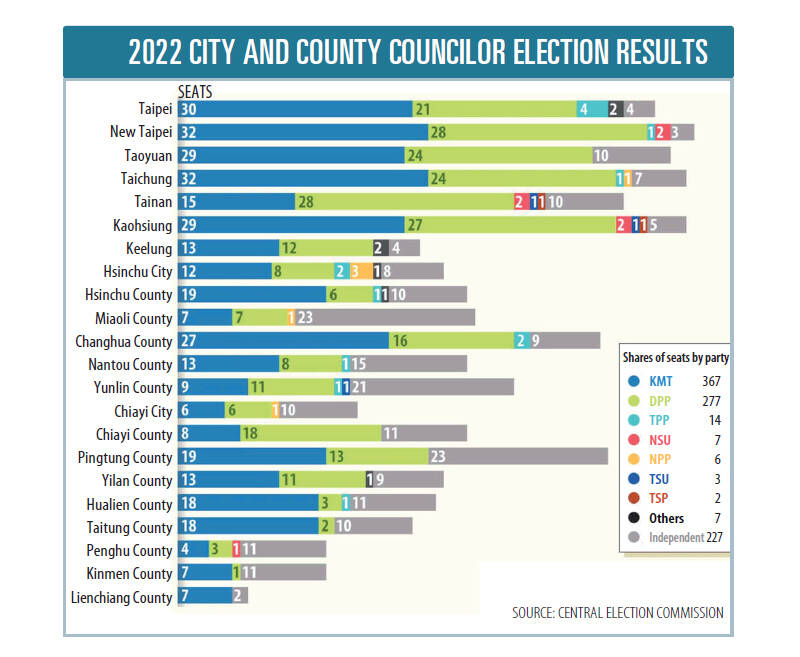Small parties on Saturday made political inroads by winning local seats in the nine-in-one elections.
In its first time competing for local government offices since its formation in August 2019, the Taiwan People’s Party (TPP) won 14 city and county councilor seats, performing the best among the smaller political parties.
The TPP, chaired by Taipei Mayor Ko Wen-je (柯文哲), secured four seats in the capital, Taipei, and a total of 10 in New Taipei City, Hsinchu City, Taichung, and Changhua, Hsinchu, Hualien, Nantou and Yunlin counties.

The TPP won more seats than older counterparts such as the New Power Party (NPP), which secured six seats, the Taiwan Solidarity Union (TSU) with three seats, the Taiwan Statebuilding Party with two, and the New Party and the Social Democratic Party with one seat each.
The TPP fielded 90 candidates in Saturday’s elections, including 48 in the six special municipalities — Kaohsiung, New Taipei City, Taichung, Taipei, Tainan and Taoyuan — which showed that the party was focused on urban areas, observers said.
The NPP lost ground with the number of seats it held at the city and county level falling sharply from 16 to six, after it lost all five of its seats in Taipei.
The party said it failed to meet its expectations in the elections and expressed regret to its supporters.
NPP Chairwoman Chen Jiau-hua (陳椒華) yesterday also announced that she was resigning from her post.
TSU Chairman Liu Yi-te (劉一德) said his party put forward five candidates for city and county council seats, winning one each in Yunlin County, Tainan and Kaohsiung.
In the six special municipalities, where a total of 377 councilor seats were up for grabs, the Chinese Nationalist Party (KMT) won 167, the Democratic Progressive Party (DPP) took 152, the TPP gained six and the NPP secured one.
Of the 533 seats in the other 16 cities and counties, the KMT won 200, the DPP 152, the TPP eight and the NPP five.

MAKING WAVES: China’s maritime militia could become a nontraditional threat in war, clogging up shipping lanes to prevent US or Japanese intervention, a report said About 1,900 Chinese ships flying flags of convenience and fishing vessels that participated in China’s military exercises around Taiwan last month and in January have been listed for monitoring, Coast Guard Administration (CGA) Deputy Director-General Hsieh Ching-chin (謝慶欽) said yesterday. Following amendments to the Commercial Port Act (商港法) and the Law of Ships (船舶法) last month, the CGA can designate possible berthing areas or deny ports of call for vessels suspected of loitering around areas where undersea cables can be accessed, Oceans Affairs Council Minister Kuan Bi-ling (管碧玲) said. The list of suspected ships, originally 300, had risen to about 1,900 as

Japan’s strategic alliance with the US would collapse if Tokyo were to turn away from a conflict in Taiwan, Japanese Prime Minister Sanae Takaichi said yesterday, but distanced herself from previous comments that suggested a possible military response in such an event. Takaichi expressed her latest views on a nationally broadcast TV program late on Monday, where an opposition party leader criticized her for igniting tensions with China with the earlier remarks. Ties between Japan and China have sunk to the worst level in years after Takaichi said in November that a hypothetical Chinese attack on Taiwan could bring about a Japanese

Right-wing political scientist Laura Fernandez on Sunday won Costa Rica’s presidential election by a landslide, after promising to crack down on rising violence linked to the cocaine trade. Fernandez’s nearest rival, economist Alvaro Ramos, conceded defeat as results showed the ruling party far exceeding the threshold of 40 percent needed to avoid a runoff. With 94 percent of polling stations counted, the political heir of outgoing Costa Rican President Rodrigo Chaves had captured 48.3 percent of the vote compared with Ramos’ 33.4 percent, the Supreme Electoral Tribunal said. As soon as the first results were announced, members of Fernandez’s Sovereign People’s Party

MORE RESPONSIBILITY: Draftees would be expected to fight alongside professional soldiers, likely requiring the transformation of some training brigades into combat units The armed forces are to start incorporating new conscripts into combined arms brigades this year to enhance combat readiness, the Executive Yuan’s latest policy report said. The new policy would affect Taiwanese men entering the military for their compulsory service, which was extended to one year under reforms by then-president Tsai Ing-wen (蔡英文) in 2022. The conscripts would be trained to operate machine guns, uncrewed aerial vehicles, anti-tank guided missile launchers and Stinger air defense systems, the report said, adding that the basic training would be lengthened to eight weeks. After basic training, conscripts would be sorted into infantry battalions that would take